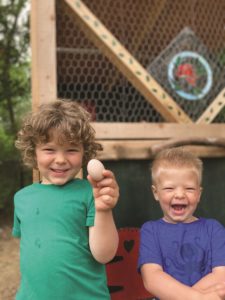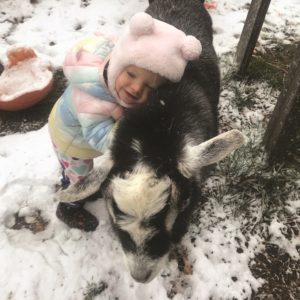How do you measure your love for a chicken? Or describe that warm-fuzzy you feel when your goat greets you with a headbutt? I’m not sure. But I want to share a secret I discovered not long after we populated our first coop: the love we feel for our farm animals is quite unlike any other.
My family keeps 16 chickens, three goats, a dog, and two cats. Our relationship with our household pets is as familiar as it was foreseen — the dog and cats live underfoot, in our beds, on our sofa. They sprawl on our laps. They demand care and reciprocate with devotion. Our home would be empty without their presence, and we ache at the thought that their lifespans, compared to ours, will not be long.

We never expected love and companionship from our farm animals. Our motivation for keeping them was always more practical. We built our coop with the joy of daily fresh eggs in mind. Our goats joined our homestead in exchange for the promise of milk and homemade cheese.
It was not until, thinking we would be moving, we gave away our first hens that I realized their presence had, in some way, become necessary to my happiness. With the purr of the flock’s constant clucking silenced, I found a sense of security gone. The feeling was primal.
Trying to get to the bottom of this, I ran into the term “biological mutualism” in an article about the domestication of animals in the Journal of Anthropological Research. Our modern minds may have forgotten that we have shared our lives with farm animals for over 11,000 years, but our bodies have not. That’s because we have, essentially, co-evolved with them.
“I love all my animals,” says Cammie Watson of Truro. But, she adds, “the connection to my farm animals is more archaic.” Watson says that what she senses with her farm animals is “a kind of silent, mutual comfort.”
“Our little gang of chickens has become a part of the rhythm of our days,” says Wellfleet coop-farmer David Simpson. He finds himself making improvements in their coop, he says, with mutuality in mind, thinking, “How can I better their lives, since they have made ours so much better already?”
Kat Watkins, who also keeps hens in Wellfleet, agrees. She hopes that by involving her two boys, Sonny, 4, and Dylan, 2, in caring for the chickens, she’s helping them gain a sense of responsibility “for these creatures who give so much in return. Their interest in our flock ebbs and flows from adoration to indifference,” she says. But she knows they are learning gratitude when she sees them “gently stroke a hen’s back and thank them for their eggs.”

Perhaps part of what’s different about the feelings we have for farm animals is that we see something more wild, less obedient, in them than we do in our pets. “There is nothing like watching goat antics,” says Provincetown veterinarian Sadie Hutchings. “They create nothing but chaos,” she says of trying to control them, “yet they bring smiles and laughter to everyone’s faces.”
What I know is this: the scent of hay in my arms as I walk into our farmyard first thing in the morning feels more indispensable than the brewed coffee awaiting my return. There is little in this world more satisfying than reaching under soft feathers for an egg so fresh it’s still warm. And my life would not be the same without the bleating, in three distinct voices, that comes from our goat enclosure each time I walk out my door. It’s a call that probably translates as “Feed me more,” but just might mean “I love you.”
Valentine Haiku
Zen of cud chewing
Headbutts when hay appears near
Endless love for goats
—Sadie Hutchings



